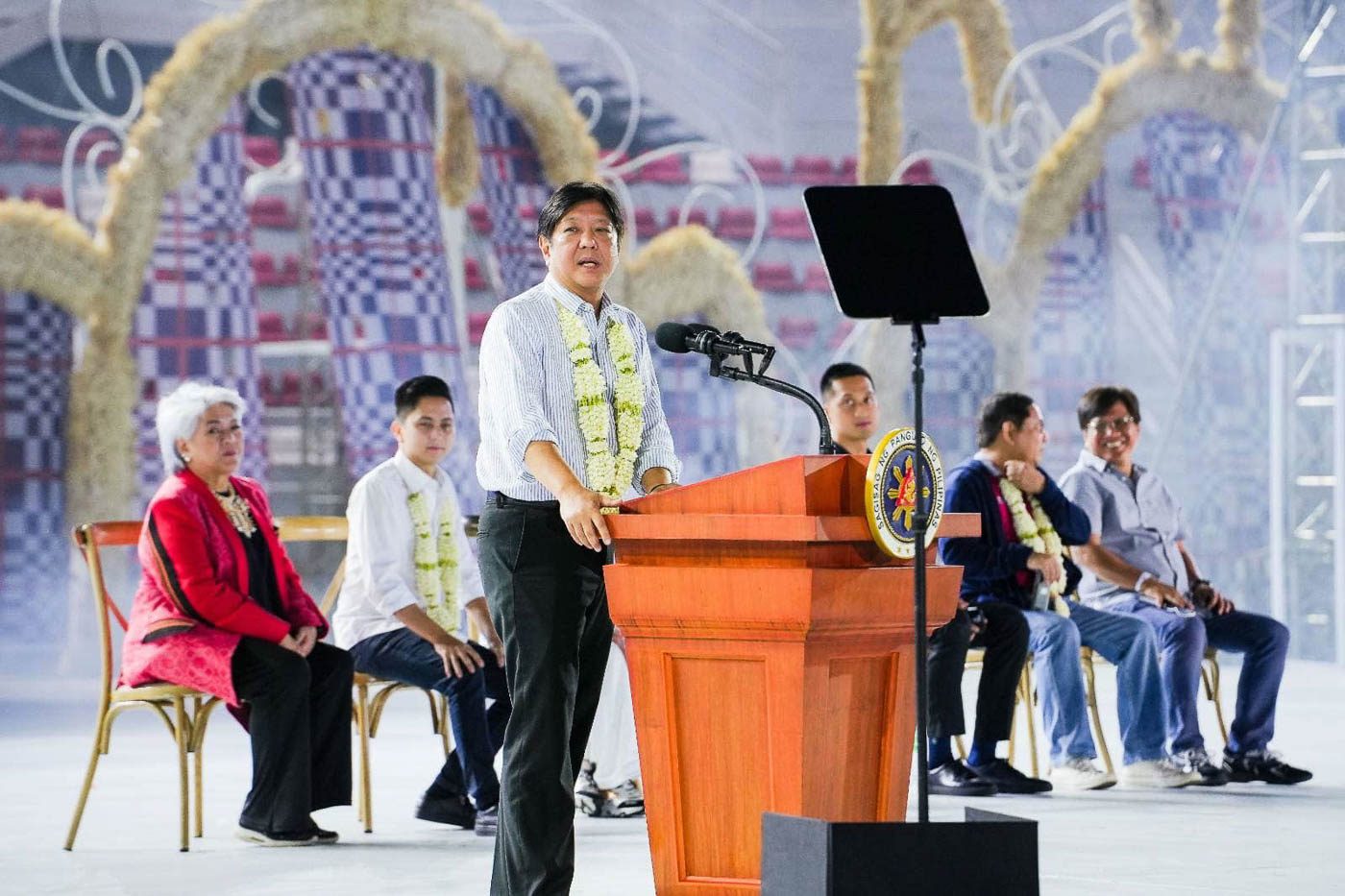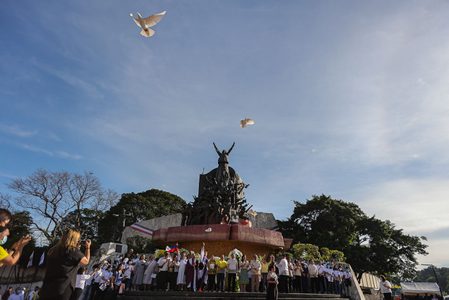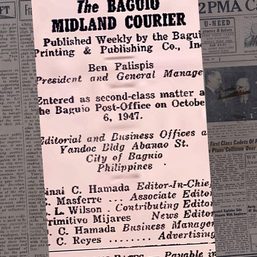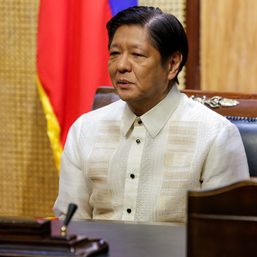SUMMARY
This is AI generated summarization, which may have errors. For context, always refer to the full article.

MANILA, Philippines – President Ferdinand Marcos Jr., whose father and family once ruled over the Philippines for over two decades, said he was “one with the nation in remembering” the EDSA People Power Revolution.
“As we look back to a time in our history that divided the Filipino people, I am one with the nation in remembering those times of tribulation and how we came out of them united and stronger as a nation,” Marcos said in a prepared message on the occasion of the revolution’s 37th anniversary on Saturday, February 25.
Marcos added, “I once again offer my hand of reconciliation to those with different political persuasions to come together as one in forging a better society – one that will pursue progress and peace and a better life for all Filipinos.”
The President sent a wreath of flowers to the People Power Monument along EDSA in Quezon City, as seen in photos from Saturday. Earlier in the morning, the National Historical Commission of the Philippines led the government’s commemoration of the revolt.
The People Power Revolution was a four-day uprising that saw Filipinos from all over the archipelago converge in the streets to call for a peaceful end to the reign of Ferdinand Marcos Sr., the current President’s father and namesake. In Metro Manila, ordinary Filipinos stormed EDSA, with many offering themselves as human shields to protect the first defense and military personnel to defect from Marcos Sr.
Seeing the tens of thousands gathered in the streets against Marcos Sr., more and more military units started defecting from February 24 to 25, 1986, until Marcos Sr. and his family – including Marcos Jr. – finally left Malacañang, which had become their dwelling for over two decades.
The days of Marcos Sr.’s rule were among the darkest for Philippine democracy, particularly the nine years under Martial Law.
Amnesty International estimates that over 70,000 people were imprisoned and 34,000 tortured during those years, while 3,240 were killed from 1972 to 1981. The Marcos clan also plundered the country’s coffers during this period, with estimates that reach up to $10 billion. The clan, with Marcos Jr. as executor of their late father’s estate, still owes up to P203 billion in estate taxes, although they have contested this as not yet final even if it is.
Even as President Marcos Jr. offers his “hand of reconciliation,” he has never apologized for the atrocities during Martial Law, saying in an October 2021 interview with CNN Philippines that he “can only apologize for [himself].” In the same interview, he also said that an apology wouldn’t be enough for some sectors.
“It’s not been enough because the political forces opposing my father, let us remember, his government fell. They won. That side of the political aisle has been dominant since 1986,” he said then. Marcos has said more recently that his joining politics was a matter of “survival” for the family after their return from exile.
In a previous interview with Rappler, historian Xiao Chua said that while the Marcos administration’s last-minute move to create a long weekend during the revolution’s anniversary was partly commendable, reconciliation by recognizing the sins of the past is key.
“To really dignify the event and the people’s revolution, they should make it a day of reconciliation, where they express regret about the past misconduct and tell people around them to stop maligning the people’s revolution and the victims of human rights violations,” he said.
Marcos, at the last minute, moved the special non-working day from the 25th to the 24th of February. The People Power Revolution is typically commemorated on the 25th, as it’s the last day of the revolution and the day the Marcoses finally left Malacañang.
Citing “holiday economics” or the practice of moving holidays around to create long weekends, Malacañang argued that moving the non-working day was fine “provided the historical significance of the EDSA People Power Revolution Anniversary is maintained.”
President Marcos won by a landslide in the May 2022 elections, which was marked by widespread disinformation. He is the first majority-elected president in the post-People Power era. – Rappler.com
Add a comment
How does this make you feel?

![[Closer Look] ‘Join Marcos, avert Duterte’ and the danger of expediency](https://www.rappler.com/tachyon/2024/06/TL-trillanes-duterte-expediency-june-29-2024.jpg?resize=257%2C257&crop_strategy=attention)

![[Newspoint] A Freedom Week joke](https://www.rappler.com/tachyon/2024/06/20240614-Filipino-Week-joke-1.jpg?resize=257%2C257&crop_strategy=attention)


![[In This Economy] Marcos’ POGO ban is popular, but will it work?](https://www.rappler.com/tachyon/2024/07/thought-leaders-marcos-pogo-ban.jpg?resize=257%2C257&crop=255px%2C0px%2C720px%2C720px)
![[Rappler Investigates] POGOs no-go as Typhoon Carina exits](https://www.rappler.com/tachyon/2024/07/newsletter-graphics-carina-pogo.jpg?resize=257%2C257&crop=424px%2C0px%2C1080px%2C1080px)





![[Just Saying] SONA 2024: Some disturbing points](https://www.rappler.com/tachyon/2024/07/TL-marcos-sona-points-july-23-2024.jpg?resize=257%2C257&crop=335px%2C0px%2C720px%2C720px)

![[OPINION] Raised on radio](https://www.rappler.com/tachyon/2024/04/raised-on-radio.jpg?resize=257%2C257&crop=396px%2C0px%2C720px%2C720px)
![[Just Saying] Marcos: A flat response, a missed opportunity](https://www.rappler.com/tachyon/2024/04/tl-marcos-flat-response-april-16-2024.jpg?resize=257%2C257&crop=277px%2C0px%2C720px%2C720px)


There are no comments yet. Add your comment to start the conversation.